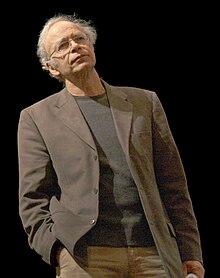Peter Singer
| Peter Singer, AC | |
|---|---|
 |
|
| Born |
Peter Albert David Singer 6 July 1946 Melbourne, Victoria, Australia |
| Alma mater |
University of Melbourne University College, Oxford |
| Website | http://www.petersinger.info/ |
| Era | Contemporary philosophy |
| Region | Western philosophy |
| School | Analytic philosophy · Utilitarianism |
|
Main interests
|
Ethics · Bioethics |
|
Notable ideas
|
Equal consideration of interests, Drowning child analogy |
|
Influences
|
|
|
Influenced
|
|
Peter Albert David Singer, AC (born 6 July 1946) is an Australian moral philosopher. He is the Ira W. DeCamp Professor of Bioethics at Princeton University, and a Laureate Professor at the Centre for Applied Philosophy and Public Ethics at the University of Melbourne. He specializes in applied ethics and approaches ethical issues from a secular, utilitarian perspective. He is known in particular for his book Animal Liberation (1975), in which he argues in favor of vegetarianism, and his essay Famine, Affluence, and Morality, in which he argues in favor of donating to help the global poor. For most of his career, he was a preference utilitarian, but he announced in The Point of View of the Universe (2014) that he had become a hedonistic utilitarian.
On two occasions, Singer served as chair of the philosophy department at Monash University, where he founded its Centre for Human Bioethics. In 1996 he stood unsuccessfully as a Greens candidate for the Australian Senate. In 2004 Singer was recognized as the Australian Humanist of the Year by the Council of Australian Humanist Societies, and in 2006 he was voted one of Australia's ten most influential public intellectuals. Singer is a cofounder of Animals Australia and the founder of The Life You Can Save.
Singer's parents were Austrian Jews who immigrated to Australia from Vienna in 1938, after Austria's annexation by Nazi Germany. They settled in Melbourne, where Singer was born. His grandparents were less fortunate: his paternal grandparents were taken by the Nazis to Łódź, and were never heard from again; his maternal grandfather died in the Theresienstadt concentration camp. He has a sister, Joan (now Joan Dwyer). Singer's grandfather, David Oppenheim, published numerous papers with Sigmund Freud before a falling out between the two in Venice. Singer's father imported tea and coffee, while his mother practiced medicine. He attended Preshil and later Scotch College. After leaving school, Singer studied law, history, and philosophy at the University of Melbourne, gaining his BA degree (hons) in 1967. Subsequently, he received an MA degree for a thesis entitled "Why should I be moral?" at the same university in 1969. He was awarded a scholarship to study at the University of Oxford, and obtained from there a BPhil degree in 1971, with a thesis on civil disobedience supervised by R. M. Hare and subsequently published as a book in 1973. Singer names Hare and Australian philosopher H. J. McCloskey as his two most important mentors.
...
Wikipedia
